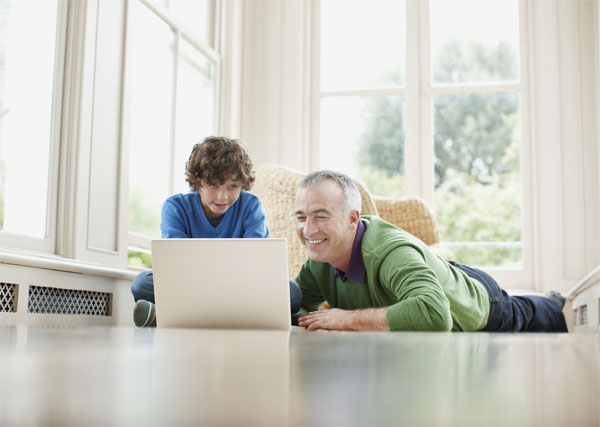While school’s out, many kids will probably be spending a longer time than is ideal in front of the computer. And if they’re teenagers, chances are they are logging onto Facebook to keep in touch with friends. It’s easy to think that because they’re computer literate you can leave them to it, but many kids don’t understand the dangers the internet can pose. Here are some tips to keep your kids computer safe:
Make an effort to become familiar with websites like Facebook and Twitter, so that when you have a discussion with your child, you know what they’re talking about.
Explain the difference between public and private on the internet. Even though your child might have their site set to the most private settings, there’s still the chance they might leave their Facebook page logged on at other computers, which can then be accessed by other people. “Nothing is truly private on the internet” is the message they need to hear, so don’t email or post anything you wouldn’t want to be broadcast to the world, or which can identify them and their whereabouts to total strangers.
Set some limits on how much time your child spends on the computer. oost parents limit it to one or two hours a day.
oost children may be familiar with the word paedophile, but have no idea what it is. So, without freaking them out, explain why they need to be wary of adults who pose as teenagers and try to befriend children. If they don’t understand the threat, they might not take it seriously.
Before your child signs up to any website, make it a rule that they check with you first so that you can visit it yourself and ensure it’s appropriate for their age. Then keep a record of their name and password and tell your child that you’ll be checking up on them from time to time. If they don’t like that, they can’t sign up. And if they’re on Facebook, make it a rule that they have to add you as a friend. That way you can see what they’re posting and what kind of conversations they’re having.
Help your child to find usernames and passwords that are gender neutral.
Tell your child to keep their passwords to themselves. Friends can sometimes think it’s funny to post things on your child’s page that can be potentially harmful. Also teach them to log off every time they leave a computer, whether it’s at home or at a friend’s house.
Make sure your child understands why they must never give out their full name, home or email address, the name of their school or their phone number. Also explain about viruses, pop-ups and downloads. All of these things have the potential to infect your computer, so tell them they must talk to you before they access pop-ups or download anything.
Keep the computer in a common room such as a lounge, so there are plenty of opportunities for you to stop and talk about the websites they’re looking at. This means you’ll probably have to look at more YouTube videos of cute cats than you need to see in a lifetime, but it’s good to be on hand if your child happens upon something that they don’t know how to deal with.
Talk to your child about bullying and the internet. Sometimes kids can think it’s funny to make silly comments or post stupid photos of another friend, yet it can be very hurtful. Ask your child how they’d feel if a stupid photo of them was posted online for everyone to see. Teach them to respect others’ privacy.
Encourage your children to use social networking websites to talk to their friends, but explain that they must also be wary of talking to strangers. If someone they don’t know wants to befriend them or contact them online, tell your child to alert you so that you can check the person out. Your child must never communicate with or accept anyone as a friend that they don’t already know personally.
oost internet providers have safety settings for computers that are used by children, so access them and make sure they’re turned on. You can also buy software online that helps you block access to certain sites based on a “bad site” list that your internet provider creates. Filtering programs can block sites from coming in and restrict personal information from being sent online. other programs can monitor and track general online activity.
For help with internet security and safety from New Zealand-based websites, visit www.cyberbully.org or www.netsafe.org.nz oy personal favourite for those parents who struggle with computer literacy is www.inmyday.org.nz




